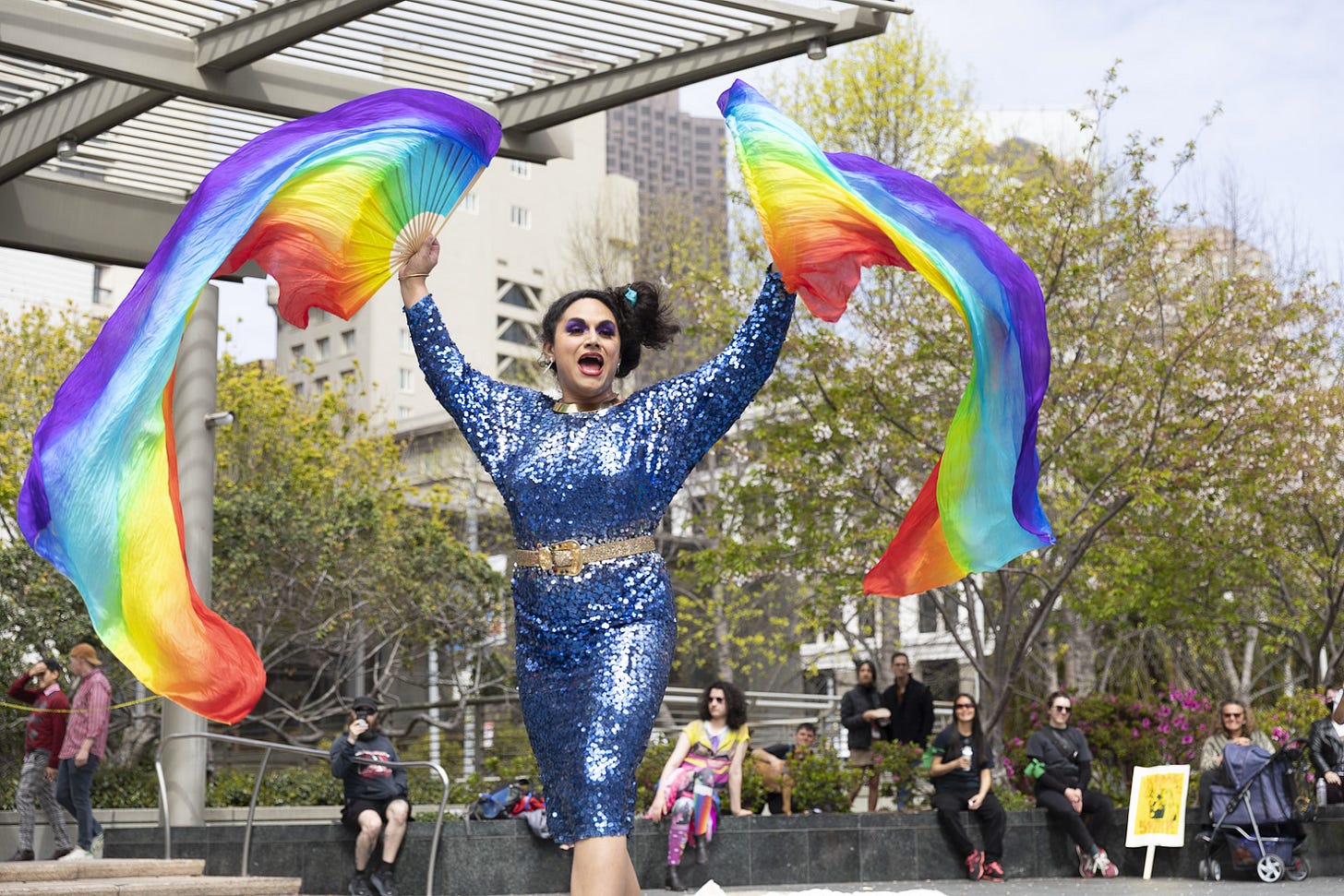Global Roundup: Afghan Women-Run Radio, Drag Protests in California, Uzbekistan GBV Legislation, ‘Women Photograph’ Project, Kashmiri Women Influencers
Curated by FG Contributor Inaara Merani
Najia Sorosh of Sadai Banowan radio station, left, speaks into a microphone in the broadcasting studio in Badakhshan province, Afghanistan [File: Courtesy of Sadai Banowan via AP]. Photo via Al Jazeera.
A women-run radio station in northeastern Afghanistan has relaunched after being targeted by the Taliban. Sadai Banowan (meaning “women’s voice” in Dari) was shut down by the Taliban at the beginning of Ramadan for playing music during the holy month.
Sadai Banowan was founded 10 years ago in the province of Badakhshan as the only women-run radio station in Afghanistan, launched as a way to celebrate and uplift women, but to also disrupt an industry dominated by men. Currently, six of the eight staff members are women.
Since the Taliban takeover almost two years ago, many journalists lost their jobs and media outlets closed due to a lack of funding and staff. Under their rule, the Taliban promised that women and girls’ rights would be respected and that they would be able to participate equal members of society, but women and girls in Afghanistan have experienced the opposite. Most women have been banned from many forms of employment, as well as education beyond the sixth grade.
Station head Najia Sorosh denied that Sadai Banowan violated any laws and regulations, claiming that the station never broadcast any music during Ramadan. The radio station was permitted to reopen a week after it was forced to close after coming to an agreement with the Information and Culture department in Badakhshan.
Protesters march to Union Square at the ‘Drag Up! Fight Back!’ march in San Francisco on Saturday, April 8, 2023. (Estefany Gonzalez/KQED).
Thousands of people took to the streets of San Francisco and West Hollywood, California to protest the recent attacks on LGBTQ+ rights in the US, particularly anti-drag and anti-trans legislation.
We wanted to show the whole world that San Francisco isn’t standing still, that Oakland isn’t standing still, that the Bay Area is not standing still, period. They come after everything I am. They come after my Black books, they come after my nonbinary books, they come after me being a woman in my womb, they come after me being transidentified. And what does that leave me? So f— them. – Alex U. Unn, LGBTQ+ rights activist and drag king
As of April 9, 2023, more than 450 bills attacking LGBTQ+ rights have been introduced in the US, including one in California. These targeted attacks aim to strip away the rights of queer and trans people, from banning books, drag shows, gender-affirming care, and more.
This is straight-up homophobia and transphobia. They dress it up as other things and pretend it’s about the safety of children. These laws are often [drafted] in ways that go towards adults as well. They’re now trying to ban gender-affirming care for anyone under the age of 26, not just children. So this is a broader attack against all LGBTQ people. They want to take us back to the 1950s — or maybe the 1850s. It’s terrifying and we’re gonna fight it hard. – State Senator Scott Wiener
Shane Zaldivar performs as the Pop Up Drag Queen at the ‘Drag Up! Fight Back!’ rally at Union Square in San Francisco on Saturday, April 8, 2023. ‘I’ve been performing publicly on the streets of San Francisco for maybe seven years now,’ said Zaldivar. ‘I like to just show joy. I like to engage with people … to show that drag and gender expression is not something that needs to be feared. It can be beautiful, it can be joyful, it can be silly.’ (Estefany Gonzalez/KQED).
In West Hollywood, the Drag March was hosted by the Los Angeles LGBT Center. Protesters marched down Santa Monica Boulevard to draw attention and raise awareness to the anti-LGBTQ+ legislation being passed in the US. In San Francisco, the “Drag Up! Fight Back!” rally was organized by a drag activist coalition, including a number of well-known icons such a Juanita MORE! and Honey Mahogany. The protest began at San Francisco City Hall before heading towards Union Square, where there were performances by drag artists.
These protests are a reminder that in the face of oppression, we do not back down, we raise our voices and make sure that they are heard.
[This] march is to show the country and the world that the LGBTQ community is not taking this lying down and that drag queens will not be silenced and we will not go back into the closet. We will not be relegated to just the back of a dark room in a club. We are here as a part of the community, we’re here to stay, and we’re gonna fight back. – Honey Mahogany, activist, politician, drag performer, and singer
Photo via Eurasianet.
In a landmark ruling, the Uzbekistan Parliament adopted legislation which will provide women and girls with greater legal protections against gender-based violence. Implemented on April 6, this bill is the first of its kind which will target GBV and domestic abuse to ensure that women and girls are aware of their rights, and can access them if necessary.
The new law will implement fines or prison time for people found guilty of assaulting a current or former spouse, a cohabitant, or the parent of a shared child. There will also be legal protections for minors who are sexually assaulted; if convicted, the victim’s age will no longer be used as grounds for mitigating the case, the assailant will likely be placed on a register, and will not be able to hold a job involving contact with children. Additionally, these predators will not be available for conditional release.
Work on this legislation lasted over one year. There were difficulties and resistance. I can state with confidence that our law is progressive and in line with international norms. - Tanzila Narbayeva
The new law still must be approved by the President before it can come into effect. In addition to the uncertainty of the President’s response, there is also uncertainty regarding the severity of offenders. Broad details of the bill have been shared, however as is customary, the specific details of the bill are not yet available to the public.
Between 2021-2022, more than 72,000 complaints were received by women and girls regarding harassment and violence; 85 percent of these incidents occurred within the family. Also in 2022, it was discovered that three young girls living at an orphanage were forced to meet with different men in exchange for money and favours for the head of the organization. The girls endured this abuse for 10 months until February 2022, and the convicted men only served one and a half years of restricted freedom. However, the Supreme Court of Uzbekistan stated on April 3 that it would be reviewing the case after there was an uproar of anger.
Nada Harib’s portrait of her cousin, Mira, in Yefren, Libya, wearing their grandmother’s tlaba (wool garment). Harib says: ‘After the revolution, Libyans, including myself, began to recognise the value of our culture and traditions, and are trying their best to revive them. In 2018, I started my ongoing project Women of Libya to explore my Amazigh roots and revive the cultural heritage of my hometown in the Nefussa mountains’. Photograph: Nada Harib.
A recent project, curated by Daniella Zalcman and Sara Ickow, compiles 100 photographs from women and nonbinary storytellers. The project emphasizes how 85 percent of the world’s photojournalists are men, meaning that an overwhelming percentage of our visual history around the world has come from a man’s perspective. ‘Women Photograph’ seeks to change this narrative and way of seeing.
This photo book covers over 50 years of history in just 100 photographs. Ranging from an image of young girls in Nairobi practicing ballet, to a 16-year old panda at an enclosure in China, these images speak to the need for a diverse perspective in our everyday lives.
The Flying Cholitas are a group of female wrestlers in Bolivia. Here, Elizabeth La Roba Corazones and Alicia De Las Flores fight at a ring on the outskirts of El Alto. Brazilian photographer Luisa Dörr says: ‘At first, I was fascinated by the skill of these Indigenous women, but then I saw it went beyond the ring. They are fighting for their rights, for recognition, for equality. To put a meal on the table for their kids. They’re fighting for their lives’. Photograph: Luisa Dörr.
Until we have balanced, representative reporting, the camera cannot offer a mirror to our global society. To get the full picture, we need a diverse set of people behind the lens. This book offers a first step. – Women Photograph project
Each photograph is accompanied by around 200 words from the photographer, adding any necessary context and speaking about the experience and subject from a fresh perspective. From conflict and resistance, or family and friendship, this book covers a range of emotions, experiences, and issues.
With the rise of social media and brand marketing on social media platforms, influencer careers have skyrocketed. Influencers, however, have always faced stigma despite their geographic location or their background. Influencing is seen as a career that does not involve much hard work or skill, and influencers are frequently criticized for indulging in rich lifestyles for their career. Social media has the power to share stories from cities and towns that we may have never heard of, which has proven to be a powerful means of amplifying and uplifting the voices of marginalized peoples.
In Kashmir, women pursuing an influencer or blogger career experience the same level of criticism and discrimination, especially as religious conservatism and patriarchal power structures have been reinstated. However, a new generation of Kashmiri women is overcoming these biases by showcasing their talent and forming lucrative careers as influencers.
Some Kashmiri women left their salary jobs because they were unhappy and only pursuing what society and their families told them what was best. For influencers like Shazia Bhatt, leaving her engineering job was the best decision she made, because she now gets to pursue a career in fashion and social media, promoting local and traditional Kashmiri attire. Bhatt believes that promoting traditional Kashmiri clothing can help keep the culture and traditions alive.
Leaving my engineering profession was a difficult decision, and being jobless for a long time made it even harder. But I followed my passion for fashion and started my journey as a fashion blogger. However, my journey was not without its challenges. I have faced criticism and harassment from people who don’t understand my profession…It’s been a challenging journey for me as a fashion blogger in Kashmir, especially during the holy month of Ramadan. I faced a lot of criticism and harassment for posting pictures on Instagram as part of my collaborations. But I didn’t let that stop me. – Shazia Bhatt
Another woman, Mehmeet Syed, has always loved Kashmiri music and wanted to continue a career doing something that she loved. Syed is now a well-known singer from Kashmir, promoting traditional music and standing tall as a symbol of emerging hope for a new generation of young Kashmiri women.
There is immense talent in every corner of the Kashmir Valley…I started singing since my childhood, and at that time, no social media was available. But today, social media has given a voice to many aspiring artists in Kashmir, and it’s a beautiful thing to see. - Mehmeet Syed
Mehmeet Syed Source: Free Press Kashmir/Feminism in India.
Inaara Merani (she/her) recently completed her Masters degree at the University of Western Ontario, studying Gender, Sexuality, and Women’s Studies with a specialization in Transitional Justice. In the upcoming years, she hopes to attend law school, focusing her career in human rights law.
Inaara is deeply passionate about dismantling patriarchal institutions to ensure women and other marginalized populations have safe and equal access to their rights. She believes in the power of knowledge and learning from others, and hopes to continue to learn from others throughout her career.










What has happened to Afghanistan is a tragedy, and whatever credibility the USA had was diminished by the mishandled and mismanaged withdrawal.